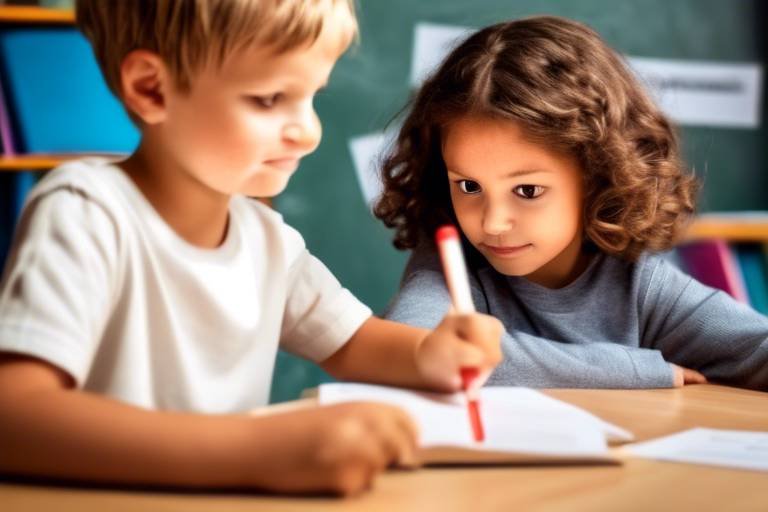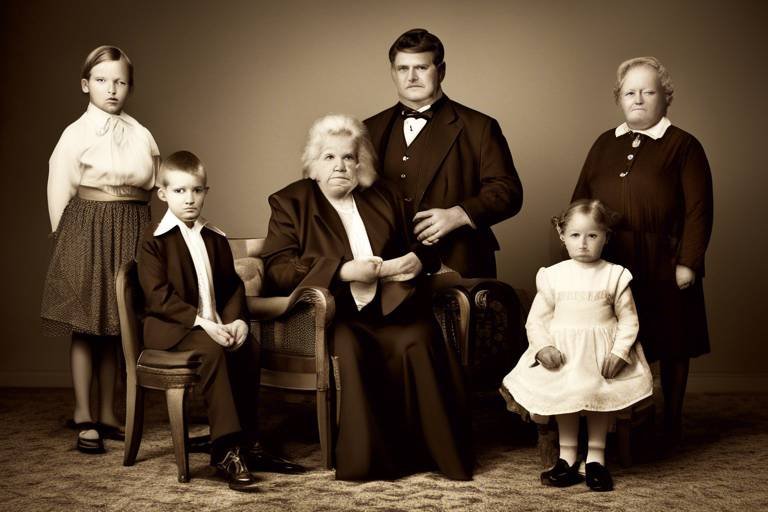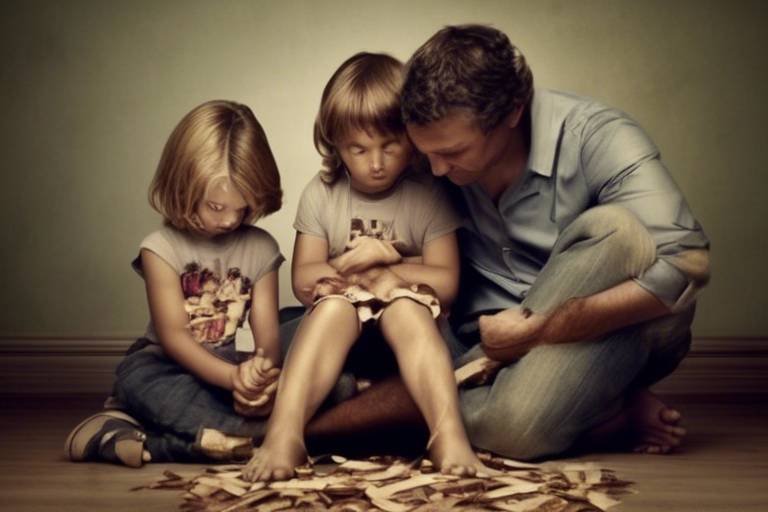How Family Relationships Shape a Child's Personality
When we think about what shapes our personalities, we often overlook the most fundamental influence: our families. Family relationships play a crucial role in molding who we become as individuals. From the moment we take our first breath, the dynamics of our family environment begin to impact us in profound ways. It's like a sculptor chiseling away at a block of marble, shaping it into a unique work of art. But how exactly do these relationships influence our personality development? Let's dive deeper into this fascinating subject.
Every family is a unique ecosystem, filled with its own set of interactions, traditions, and emotional climates. The love and support we receive from our parents and siblings can either fortify our self-esteem or chip away at it. For instance, a child raised in a nurturing environment where open communication is encouraged is likely to develop strong emotional intelligence. They learn to express their feelings and understand the emotions of others, which is crucial for building healthy relationships later in life. Conversely, a child who grows up in a home filled with conflict and criticism may struggle with self-worth and social interactions.
Moreover, the way families communicate can significantly affect a child's ability to navigate the world. Think of communication as the bridge that connects family members. When that bridge is strong and well-maintained, it allows for the free flow of ideas, feelings, and support. However, if the bridge is shaky or broken, misunderstandings and emotional distance can occur. This can lead to children who either withdraw from social situations or become overly aggressive in their interactions.
It's also important to consider the role of emotional support in a child's personality development. A nurturing family environment acts as a safety net, allowing children to explore the world with confidence. When children feel secure in their family relationships, they are more likely to take risks and pursue their interests. This emotional backing is like the wind beneath a bird's wings, enabling them to soar to new heights. On the other hand, a lack of support can create a fear of failure, leading to a more cautious and reserved personality.
Conflict resolution within the family is another key factor that shapes personality. Every family experiences conflicts, but how they handle these disputes can teach children valuable life skills. For example, a family that encourages open dialogue and compromise during disagreements fosters problem-solving abilities in their children. They learn that it's okay to disagree and that conflicts can be resolved through communication and understanding. In contrast, children who witness unresolved conflicts or are taught to avoid confrontation may struggle with assertiveness and cooperation in their future relationships.
Siblings also play a significant role in personality development. The dynamics of sibling relationships can teach children about sharing, competition, and cooperation. For instance, an older sibling may naturally take on a leadership role, while a younger sibling might learn to be more adaptable and flexible. Birth order can influence these traits as well; firstborns often exhibit more responsibility, while later-born children may be more social and outgoing. It's fascinating how these roles can shape our interactions with others as we grow.
Extended family members, such as grandparents, aunts, and uncles, also contribute to a child's personality development. They provide additional layers of support and perspectives that enrich a child's understanding of the world. These relationships can introduce children to diverse viewpoints and traditions, which can help them form a more rounded personality. Just like a tapestry woven from various threads, these influences create a complex and beautiful picture of who we are.
Cultural and societal influences cannot be ignored either. The values and expectations imposed by our cultural backgrounds often dictate how family relationships are structured. These cultural norms shape children's perceptions of themselves and others, influencing their personality traits and values. For example, in cultures that prioritize collectivism, children might develop a stronger sense of community and cooperation, while those in individualistic cultures may focus more on personal achievement and independence.
Lastly, the long-term effects of family dynamics are profound. The experiences we have in our formative years can resonate throughout our lives, impacting our adult relationships, career choices, and overall mental health. It's like planting a seed; the care and attention it receives in its early stages determine how well it grows and flourishes in the future. Understanding this connection is crucial for parents and caregivers who wish to foster positive personality traits in their children.
In conclusion, the intricate web of family relationships is a powerful force in shaping a child's personality. By fostering healthy communication, emotional support, and effective conflict resolution, families can create an environment that nurtures positive personality development. So, the next time you think about personality, remember the vital role your family plays in that journey.
- How do parenting styles affect a child's personality?
Different parenting styles can lead to various personality traits. Authoritative parenting, characterized by warmth and structure, often results in children with high self-esteem and social skills. - What is the impact of sibling relationships on personality?
Siblings can teach valuable lessons about cooperation, competition, and social dynamics, influencing traits such as leadership and adaptability. - Can extended family influence personality development?
Yes! Extended family members often provide additional support and diverse perspectives that contribute to a child's personality. - What role does culture play in shaping personality?
Cultural backgrounds and societal expectations significantly influence family relationships, which in turn shape a child's personality traits and values.

The Role of Parenting Styles
When it comes to shaping a child's personality, the parenting style adopted by caregivers plays a crucial role. Think of parenting styles as the different flavors of ice cream—each one has its unique taste and impact. Just like some kids might prefer chocolate while others lean towards vanilla, children respond differently to various parenting approaches. The three primary styles—authoritative, authoritarian, and permissive—each bring their own set of characteristics that can significantly influence a child's behavior and personality traits.
Starting with the authoritative style, this approach is often considered the gold standard. Parents who adopt this style are both responsive and demanding. They set clear rules and expectations while also being supportive and nurturing. This balance allows children to develop a strong sense of self-esteem and social competence. Research shows that children raised in authoritative households tend to be more independent, socially adept, and emotionally stable. They learn to express their thoughts and feelings effectively, which is essential for their personality development.
On the flip side, we have the authoritarian style. These parents are more like strict coaches, imposing rules without much room for discussion. While they may have good intentions, this approach often leads to children who are obedient but may struggle with self-esteem and social skills. They might feel pressured to conform and could become overly reliant on external validation, which can stifle their individuality. In the long run, these children may find it challenging to assert themselves in social situations, leading to personality traits that lean towards anxiety or withdrawal.
Then there's the permissive style, which is akin to being the fun-loving friend rather than the authoritative parent. These caregivers are warm and indulgent but often fail to enforce rules or boundaries. While this can foster creativity and self-expression, it can also result in children who struggle with self-discipline and responsibility. They may grow up feeling entitled and less equipped to handle challenges, which can hinder their personal growth and social interactions.
To sum it up, the way parents interact with their children can lay the foundation for their personality. Here’s a quick comparison:
| Parenting Style | Characteristics | Impact on Child |
|---|---|---|
| Authoritative | Responsive, demanding, supportive | High self-esteem, social competence, independence |
| Authoritarian | Strict, unresponsive, demanding | Obedience, low self-esteem, anxiety |
| Permissive | Indulgent, lenient, warm | Creativity, entitlement, lack of self-discipline |
Understanding these parenting styles helps us appreciate the intricate ways in which family dynamics shape a child's personality. It’s not just about the rules or the lack thereof; it’s also about the emotional environment that parents create. As children navigate their formative years, they absorb these lessons, which can influence their interactions with peers and their approach to life challenges.
So, have you ever thought about how your upbringing might influence your personality today? It's fascinating to consider how the flavors of parenting can leave a lasting impression on who we become.

Communication Patterns
Communication is the lifeblood of any family, acting as the foundation upon which relationships are built. When family members engage in open and honest dialogue, it creates a nurturing environment that fosters emotional intelligence in children. Imagine a garden where the flowers bloom only when watered regularly; similarly, children thrive when they feel heard and understood. Effective communication not only helps children articulate their thoughts and feelings but also teaches them how to navigate social interactions outside the home.
Consider this: when a child observes their parents resolving conflicts through calm discussions rather than shouting matches, they learn the importance of empathy and negotiation. They see firsthand how to express their emotions without resorting to anger or frustration. This skill is invaluable as they grow, enabling them to build healthy relationships with peers and eventually in romantic partnerships.
Moreover, the patterns of communication established in childhood often set the stage for future interactions. For instance, children raised in families where active listening is practiced are more likely to develop strong social skills. They learn to value others' opinions and feelings, which enhances their ability to connect with people from diverse backgrounds. In contrast, children who experience poor communication may struggle with self-expression and interpersonal relationships later in life.
Here are some key elements of effective communication patterns that can significantly influence a child's personality development:
- Active Listening: This involves truly hearing what someone else is saying, showing that their thoughts and feelings are valued.
- Non-Verbal Cues: Body language, facial expressions, and tone of voice all play a critical role in how messages are conveyed and received.
- Encouraging Expression: Parents should encourage their children to share their thoughts and feelings openly, fostering a sense of security and validation.
In conclusion, the communication patterns established within a family have a profound impact on a child's personality. By creating an environment where dialogue is encouraged and respected, families can equip their children with the tools they need to navigate the complexities of the world around them. As they grow, these children will carry forward the lessons learned at home, shaping not just their personalities but also their future relationships.

Emotional Support and Security
When we think about the emotional support a child receives from their family, it’s like imagining a sturdy tree that provides shade and shelter. A nurturing family environment acts as that tree, offering a safe haven where children can thrive and develop a strong sense of self. This emotional security is crucial for a child’s personality development. Without it, children may struggle with feelings of inadequacy or anxiety, much like a plant deprived of sunlight and water.
Emotional support manifests in various forms, from simple gestures of affection to open dialogues about feelings and experiences. When parents and caregivers actively listen to a child's concerns, it fosters a sense of belonging and validation. This practice not only helps children articulate their emotions but also teaches them to recognize and empathize with the feelings of others. In essence, children learn that it’s okay to express their emotions, which is a vital skill for building healthy relationships later in life.
Moreover, a secure emotional foundation allows children to take risks and explore the world around them. Just as a bird learns to fly because it knows its nest is safe, children who feel emotionally secure are more likely to venture out, try new things, and develop their unique personalities. They become resilient, bouncing back from setbacks with a positive outlook, which is essential for navigating the ups and downs of life.
In contrast, a lack of emotional support can lead to several challenges. Children may develop low self-esteem, struggle with anxiety, or even exhibit behavioral issues. For instance, when children do not feel secure in their family environment, they might resort to negative coping mechanisms, such as withdrawal or aggression, to express their distress. This cycle can hinder their social interactions and personality development, creating a ripple effect that influences their future relationships and self-perception.
To illustrate the importance of emotional support, consider the following table that highlights the differences in personality traits between children who receive ample emotional support and those who do not:
| Aspect | With Emotional Support | Without Emotional Support |
|---|---|---|
| Self-Esteem | High | Low |
| Resilience | Strong | Weak |
| Social Skills | Well-developed | Poorly developed |
| Emotional Regulation | Effective | Ineffective |
As we navigate through life, the emotional support we receive from our families shapes our perceptions and interactions with the world. It’s crucial for parents to actively cultivate a supportive atmosphere where children feel valued and understood. This can be achieved through simple practices, such as regular family meetings to discuss feelings, encouraging children to share their thoughts without fear of judgment, and validating their emotions even when they may seem trivial to adults.
In conclusion, emotional support and security are not just nice-to-haves; they are fundamental to a child's personality development. By providing a nurturing environment, families can help children grow into emotionally intelligent, resilient adults who can navigate the complexities of life with confidence and empathy. So, let’s strive to be that sturdy tree for our children, offering them the shade and support they need to flourish.
- What is emotional support, and why is it important for children?
Emotional support involves providing comfort, understanding, and encouragement to children, which is essential for their overall development and well-being. - How can parents provide emotional support?
Parents can provide emotional support by actively listening, validating their child's feelings, and creating an open environment for communication. - What are the signs of a child lacking emotional support?
Signs may include low self-esteem, withdrawal from social interactions, anxiety, and difficulty expressing emotions.

Conflict Resolution Skills
Conflict is an inevitable part of family life. Just like storms that come and go, conflicts can arise unexpectedly, but how families navigate these challenges can significantly shape a child's personality and future relationships. When children witness their parents and siblings resolving disagreements constructively, they learn valuable that will serve them throughout their lives. Imagine a child observing a heated discussion between parents. If they see their parents listening to each other, expressing their feelings calmly, and finding a compromise, they begin to internalize these behaviors. This teaches them that conflicts don't have to end in chaos; instead, they can lead to understanding and growth.
Moreover, the ability to resolve conflicts effectively fosters a sense of emotional intelligence. Children learn to identify their own emotions and recognize those of others, which is crucial for building healthy relationships. They become adept at navigating social situations, understanding that while disagreements are normal, the way they handle them can either strengthen or weaken their bonds with others. For instance, a child who learns to approach conflicts with empathy and patience is more likely to develop strong friendships and maintain positive relationships in adulthood.
In addition to direct observation, families can create a safe space for children to practice these skills. Encouraging children to voice their opinions during family discussions can empower them to express themselves and resolve conflicts among siblings. For example, when siblings argue over a toy, parents can step in and guide them through the process of negotiation. This may involve asking each child to explain their perspective, encouraging them to listen to one another, and helping them brainstorm solutions together. Such experiences not only teach children how to resolve disputes but also promote a sense of teamwork and collaboration.
It's also essential to recognize that not all conflicts are negative. In fact, they can be seen as opportunities for learning and growth. When families embrace conflict as a natural part of life, they cultivate an environment where children feel safe to express their feelings. This openness can lead to deeper connections among family members and foster resilience in children. They learn that it’s okay to disagree and that finding common ground is a valuable skill.
To further enhance conflict resolution skills, families can benefit from implementing specific strategies. Here are some effective methods:
- Model Positive Behavior: Parents should demonstrate healthy conflict resolution in their interactions.
- Encourage Open Dialogue: Create an environment where everyone feels comfortable sharing their thoughts and feelings.
- Teach Problem-Solving Techniques: Help children learn how to identify the root of a conflict and brainstorm potential solutions.
- Practice Active Listening: Encourage family members to listen attentively and validate each other's feelings during discussions.
By incorporating these practices, families can nurture a generation of children who are not only equipped to handle conflicts but also thrive in their personal and professional relationships. Ultimately, the skills learned in the family unit can ripple out into the wider world, influencing how children approach challenges and interact with others throughout their lives.
Q: What are conflict resolution skills?
A: Conflict resolution skills are abilities that enable individuals to resolve disagreements in a constructive manner, fostering understanding and cooperation.
Q: How can parents teach their children conflict resolution skills?
A: Parents can model positive conflict resolution, encourage open dialogue, and provide opportunities for children to practice these skills in real-life situations.
Q: Why is it important for children to learn conflict resolution skills?
A: Learning conflict resolution skills helps children develop emotional intelligence, enhances their social skills, and prepares them for healthy relationships in the future.

Siblings and Birth Order Effects
When it comes to understanding how family dynamics shape a child's personality, one cannot overlook the significant role of siblings and the effects of birth order. Have you ever wondered why the oldest child often takes on a leadership role, while the youngest might be seen as the "baby" of the family? These patterns are not just coincidence; they are deeply rooted in the way siblings interact and the unique positions they hold within the family structure.
Research suggests that siblings can influence each other's personalities in profound ways. For instance, the oldest sibling often assumes a caretaker role, which can lead to traits such as responsibility, organization, and sometimes, a bit of perfectionism. They may feel pressure to set a good example, which can shape their self-esteem and social interactions. In contrast, the middle child often becomes the peacemaker, learning to navigate between the demands of older and younger siblings. This can foster skills in negotiation and compromise, making them adept at resolving conflicts.
The youngest sibling, on the other hand, may develop traits associated with being more free-spirited and sociable. They often benefit from the experiences and mistakes of their older siblings, which can lead to a more relaxed approach to life. This dynamic creates a rich tapestry of personality traits that are influenced not just by individual characteristics but by the birth order within the family.
To further illustrate these dynamics, consider the following table that outlines some common personality traits associated with each birth order position:
| Birth Order Position | Common Personality Traits |
|---|---|
| Oldest | Responsible, organized, perfectionist, leadership skills |
| Middle | Peacemaker, negotiator, adaptable, social |
| Youngest | Free-spirited, sociable, outgoing, risk-taker |
Interestingly, the effects of birth order can also extend beyond immediate family interactions. Siblings often serve as practice partners for social skills, teaching each other how to cooperate, compete, and resolve conflicts. This sibling rivalry can be a double-edged sword; while it may spark competitiveness, it also fosters resilience and the ability to handle interpersonal challenges. In many ways, siblings are like mirrors reflecting different facets of personality, helping each other to grow and adapt.
Moreover, the impact of siblings can vary significantly based on the number of children in the family and the age gaps between them. For example, a larger family might create a more competitive environment, while a small family with a significant age gap might lead to a more nurturing relationship between siblings. These variations can lead to unique personality developments that are as diverse as the families themselves.
In conclusion, the relationship between siblings and the effects of birth order are powerful forces in shaping a child's personality. Whether it's through competition, cooperation, or simply the dynamics of sibling interactions, these factors contribute to the rich and complex development of individual traits. So, the next time you observe sibling interactions, remember that these relationships are not just about fun and games; they are foundational in molding who we become.

Influence of Extended Family
The extended family plays a crucial role in shaping a child's personality, often acting as a secondary support system that complements the immediate family. Think about it—when you have grandparents, aunts, uncles, and cousins in the mix, you're not just getting extra hands to help out; you're also gaining a wealth of experiences and perspectives. This diverse network can significantly influence a child's emotional and social development, enriching their understanding of relationships and the world around them.
For instance, grandparents often provide a sense of stability and wisdom that can be incredibly beneficial for children. They might share stories from their own lives, offering lessons learned through the years. This generational exchange not only helps children develop a sense of identity but also fosters qualities like respect and gratitude. Moreover, the unconditional love often found in grandparent-grandchild relationships can bolster a child's self-esteem, making them feel valued and secure.
Aunts and uncles can also play a vital role in a child's life. They often bring a different energy and perspective, acting as friends and mentors rather than strict authority figures. This unique dynamic can encourage children to express themselves more freely, knowing they have a safe space to explore their thoughts and feelings. In many cases, these relationships can lead to improved communication skills and emotional intelligence, essential components for a well-rounded personality.
Additionally, the presence of cousins can introduce elements of competition and cooperation. Through play and shared experiences, children learn how to navigate social interactions, develop teamwork skills, and even engage in healthy rivalry. These interactions can shape their personality traits, influencing how they relate to peers and authority figures later in life. It’s like a mini-society where they can practice and hone their social skills before stepping out into the wider world.
It's also important to consider that extended family members can provide different cultural and social perspectives, which can be particularly enriching. For example, children who grow up with a diverse extended family may develop a broader worldview, learning to appreciate and respect cultural differences. This exposure not only enhances their personality but also prepares them to thrive in an increasingly globalized society.
In conclusion, the influence of extended family is profound and multifaceted. These relationships can provide emotional support, diverse perspectives, and valuable life lessons that shape a child's personality in ways that are often overlooked. By fostering strong connections with extended family members, parents can help their children develop into well-rounded individuals equipped with the skills and values necessary to navigate life's challenges.
- How do extended family relationships impact a child's self-esteem?
Extended family members often provide unconditional love and support, which can significantly boost a child's self-esteem and sense of worth. - Can having a close extended family help with social skills?
Yes! Interacting with a variety of family members, such as cousins and aunts, allows children to practice communication and social skills in a safe environment. - What role do grandparents play in personality development?
Grandparents often impart wisdom and stability, helping children develop respect and a sense of identity through shared family history. - How can parents encourage relationships with extended family?
Parents can facilitate regular family gatherings, encourage communication through phone calls or video chats, and share family stories to strengthen these bonds.

Cultural and Societal Influences
The impact of cultural and societal influences on family relationships cannot be overstated. These factors play a crucial role in shaping a child's personality, values, and outlook on life. Culture encompasses the shared beliefs, practices, and norms of a group, while societal influences refer to the broader context in which families operate, including economic conditions, education systems, and community support. Together, they create a rich tapestry that influences how family members interact and how children perceive their place in the world.
For instance, in collectivist cultures, where the family unit is prioritized over individual desires, children often learn the importance of cooperation and interdependence. They grow up understanding that their actions affect not just themselves but also their family and community. This can foster a sense of responsibility and empathy, which are vital components of a well-rounded personality. On the other hand, in more individualistic societies, children may be encouraged to pursue their own goals and assert their independence, which can lead to the development of traits like self-confidence and personal ambition.
Moreover, societal expectations can dictate how family members interact with one another. For example, in some cultures, respect for elders is paramount, influencing how children communicate and engage with their parents and grandparents. This respect can instill a sense of humility and gratitude, shaping their personality in profound ways. Conversely, in societies where open dialogue and egalitarian relationships are valued, children may develop stronger communication skills and a sense of equality, impacting their future relationships and social interactions.
To illustrate the differences in cultural influences, consider the following table:
| Cultural Context | Influence on Personality Development |
|---|---|
| Collectivist | Emphasis on cooperation, community, and responsibility |
| Individualistic | Focus on independence, self-expression, and personal achievement |
It's also essential to recognize that societal changes, such as urbanization or globalization, can affect family dynamics and, consequently, children's personality development. For example, as families move to urban areas, they may encounter new cultural norms and values that challenge traditional practices. This exposure can lead to a blending of influences, creating a unique environment for personality growth.
In conclusion, cultural and societal influences are like the backdrop against which family relationships unfold. They shape the narrative of a child's upbringing, guiding their emotional development and interpersonal skills. Understanding these influences is crucial for parents and caregivers who wish to foster a supportive environment that nurtures positive personality traits.
- How do cultural influences affect children's behavior? Cultural influences shape children's behavior by instilling values and norms that dictate how they interact with others and perceive themselves.
- What role does society play in family relationships? Society provides the context in which families operate, influencing their dynamics, communication styles, and conflict resolution approaches.
- Can cultural influences change over time? Yes, cultural influences can evolve due to factors like globalization, migration, and technological advancements, impacting family relationships and children's personality development.

Long-term Effects of Family Dynamics
The on a child's personality are profound and often far-reaching. From the moment a child enters the world, they are shaped by their family environment. This influence does not simply vanish as they grow older; rather, it becomes a foundational element of their identity. Think of it like a tree: the roots represent family dynamics, and the branches symbolize the various directions a child's personality can take. If the roots are strong and healthy, the tree can flourish; if they are weak or damaged, the tree may struggle to thrive.
One of the most significant long-term effects is the way family dynamics influence a child's relationships in adulthood. For instance, children raised in nurturing environments are more likely to develop healthy relationships characterized by trust and empathy. Conversely, those who experience conflict or neglect may carry forward patterns of distrust or insecurity, which can hinder their ability to form close connections later in life. This is particularly evident in romantic relationships, where past family experiences can dictate how individuals approach love, conflict, and intimacy.
Moreover, the communication styles learned within the family unit play a crucial role in shaping an individual's professional life. A child who grows up in a household that values open dialogue and active listening is likely to carry those skills into their career, enhancing their ability to collaborate and lead effectively. In contrast, children from families that discourage open expression may struggle with assertiveness and conflict resolution in the workplace.
Another critical aspect to consider is how family dynamics affect mental health. Research indicates that children who receive consistent emotional support tend to have better coping mechanisms as adults. They are more resilient in the face of stress and are often better equipped to handle life's challenges. On the other hand, children who grow up in chaotic or unstable environments may develop anxiety, depression, or other mental health issues that can persist into adulthood.
To illustrate these concepts, consider the following table that summarizes the potential long-term personality outcomes based on different family dynamics:
| Family Dynamic | Potential Long-term Effects |
|---|---|
| Nurturing Environment | High self-esteem, strong relationships, effective communication skills |
| Conflict-ridden Environment | Low self-worth, difficulty in relationships, anxiety issues |
| Neglectful Environment | Trust issues, emotional instability, poor coping strategies |
In conclusion, the family dynamics experienced during childhood set the stage for a person's future. Whether it’s through the development of emotional intelligence, relationship skills, or mental health resilience, the impact is undeniable. As parents and caregivers, it’s crucial to recognize that the way we interact with our children can have lasting effects, shaping not just their personality but their entire life trajectory.
- How do family dynamics affect a child's self-esteem?
Family dynamics play a crucial role in shaping a child's self-esteem. Positive reinforcement and emotional support can foster a strong sense of self-worth, while negative interactions can lead to feelings of inadequacy. - Can changing family dynamics impact adult relationships?
Absolutely! Changes in family dynamics, such as divorce or the addition of new family members, can significantly influence how adults approach relationships and handle conflicts. - What can parents do to promote healthy family dynamics?
Open communication, emotional support, and constructive conflict resolution are key strategies for fostering a healthy family environment that benefits children's personality development.

Strategies for Positive Family Relationships
Building and maintaining positive family relationships is like nurturing a garden; it requires attention, care, and the right conditions to flourish. To foster a healthy family environment, it's essential to focus on several key strategies that can make a significant difference. First and foremost, open communication is crucial. Families that encourage sharing thoughts and feelings create a safe space where everyone feels heard and valued. This can be as simple as setting aside time each week for a family meeting or casual dinner where everyone can share their experiences without judgment.
Moreover, emotional support plays a pivotal role in strengthening family bonds. When family members actively listen to one another and validate each other's feelings, it cultivates a sense of belonging and security. For instance, a parent who acknowledges their child's feelings about a tough day at school not only helps the child feel understood but also teaches them the importance of empathy and support in relationships.
Conflict resolution is another vital strategy. Every family faces disagreements, but how these conflicts are managed can either build or break relationships. Families should strive to approach conflicts as opportunities for growth rather than battles to win. Teaching children to express their feelings calmly and to listen to others can lead to healthier interactions. For example, using "I" statements, such as "I feel upset when..." instead of accusatory language, can help de-escalate tensions and promote understanding.
Additionally, spending quality time together can significantly enhance family relationships. Whether it's playing board games, going for walks, or cooking meals together, these shared experiences create lasting memories and strengthen the familial bond. It's essential to prioritize these moments, especially in today's fast-paced world where everyone seems to be busy. Making time for fun and laughter can act as a glue that holds the family together.
Lastly, it's important to recognize and celebrate each family member's individuality. Every person brings unique strengths and perspectives to the family dynamic. Acknowledging these differences and encouraging each member to pursue their interests fosters a supportive atmosphere that promotes personal growth. For example, if one child is passionate about sports while another loves art, finding ways to support both interests can enrich the family's collective experience.
In summary, implementing these strategies—open communication, emotional support, effective conflict resolution, quality time, and celebrating individuality—can create a nurturing environment that significantly enhances a child's personality development. Remember, a strong family foundation not only benefits the children but also enriches the lives of all family members.
- What are the signs of a positive family relationship?
Signs include open communication, mutual respect, emotional support, and the ability to resolve conflicts constructively. - How can I improve communication in my family?
Encourage regular family meetings, practice active listening, and create a safe space for everyone to express their thoughts and feelings. - What role does quality time play in family relationships?
Quality time fosters connections, builds trust, and creates shared memories that strengthen family bonds. - How can conflict resolution be taught to children?
Model effective conflict resolution strategies, encourage the use of "I" statements, and practice role-playing scenarios to help children learn how to navigate disagreements.
Frequently Asked Questions
- How do parenting styles affect a child's personality?
Parenting styles play a crucial role in shaping a child's personality. For instance, authoritative parenting tends to foster independence and self-esteem, while authoritarian parenting may lead to issues with self-worth and social skills. Understanding these styles helps parents create a nurturing environment that supports healthy personality development.
- What is the importance of communication within the family?
Effective communication in the family is vital for developing emotional intelligence and social skills in children. It teaches them how to express their feelings and understand others, which are essential for building strong relationships and a well-rounded personality.
- How does emotional support contribute to personality development?
A nurturing family environment provides the emotional support children need to develop resilience and a positive self-image. This foundation is crucial for forming a healthy personality, enabling children to face challenges confidently as they grow.
- What skills do children learn from family conflict resolution?
When families handle conflicts constructively, children learn valuable problem-solving and negotiation skills. These experiences shape their personality traits, such as cooperation and assertiveness, which are essential for successful interactions in adulthood.
- How do siblings and birth order influence personality?
Siblings and birth order can significantly impact personality traits. For example, firstborns often develop leadership qualities, while younger siblings may be more adaptable and social. These dynamics can affect how children relate to their peers and navigate social situations.
- What role does extended family play in personality development?
Extended family members, like grandparents and aunts/uncles, provide additional support and diverse perspectives that enrich a child's personality development. Their influence can introduce children to different values and ways of thinking, enhancing their overall growth.
- How do cultural and societal influences shape family relationships?
Cultural backgrounds and societal expectations significantly influence family dynamics, which in turn affect a child's personality traits and values. Understanding these influences can help families foster a supportive environment that respects diverse perspectives.
- What are the long-term effects of family dynamics on personality?
The experiences children have within their families can have lasting effects on their adult relationships, career choices, and mental health. Positive family dynamics lay the groundwork for a stable personality, while negative experiences can lead to challenges later in life.
- What strategies can promote positive family relationships?
Promoting healthy family relationships involves open communication, emotional support, and effective conflict resolution strategies. These practices can significantly enhance a child's personality development and overall well-being, leading to stronger family bonds.



















